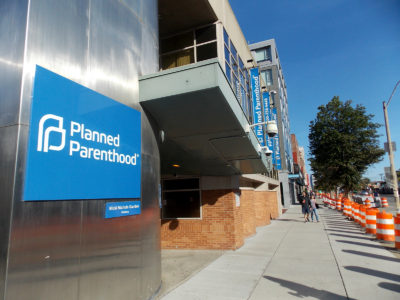
The National Institute for Reproductive Health launched its Local Reproductive Index Tuesday, giving Boston three out of five stars in reproductive freedom based on the city’s reproductive health, rights and policies.
The NIRH index measured reproductive freedom in 40 U.S. cities in order to shed light on certain states which can take better care of reproductive freedoms and make changes beginning locally, according to a press release from NIRH.
“The launch of the Local Reproductive Freedom Index is taking NIRH’s city-based advocacy model to the next level,” Andrea Miller, president of NIRH and the NIRH Action Fund, said in the press release. “We know that radical progress starts local — and that now is the time for cities to hold their own and protect their residents.”
The index measured reproductive freedom based on performance in protecting abortion clinic access, allocating funding for reproductive health care, providing support for young people and families, and advancing inclusive policies, according to the index.
Boston specifically has no regulations on crisis pregnancy centers, no funding for abortions and no supportive breastfeeding policies, according to the index, but does provide funding for sex education and family planning among other advantages.
Boston fell behind San Francisco, New York City and Philadelphia, who all received four and a half stars, but scored higher than cities like Miami and Houston who both received two stars.
Shoshanna Ehrlich, professor of women’s and gender studies at the University of Massachusetts Boston, said she thinks Boston deserves a higher score.
“Compared to so many places in the country Boston is in pretty good shape,” Ehrlich said. “We have one of the most organized and collaborate panel of attorneys and advocates … and a whole network of clinics that provide family planning services. It doesn’t seem accurate to me.”
Emma O’Brien, a volunteer with the Boston Abortion Support Collective, an organization providing support to people who have abortions in the greater Boston area, said a significant barrier to reproductive freedoms in Massachusetts are the state’s parental consent laws for minors seeking abortions.
“Anybody under the age of 18 either needs a parent’s consent or to go in front of a judge in court in order to access that healthcare,” O’Brien said. “I think that’s a big barrier to abortion in this state that most folks would assume has fairly non-restrictive abortion laws.”
O’Brien added the “buffer zone” law outside of abortion clinic doors was overturned, meaning protesters are able to approach anybody entering an abortion clinic.
“I personally had a client through BASC on Good Friday and there were many more folks than I expected at the clinic doors,” O’Brien said. “Luckily, the protesters mostly wrapped up by the time we were ready to leave the clinic but I’m glad BASC is there to walk people through those kinds of situations when they may otherwise not have a good option.”
Several Boston residents were surprised to hear Boston’s three stars rating on the index.
Kamala Brown, 22, of Dorchester, said she thinks Boston can improve in providing reproductive resources for women and awareness of what the city is lacking in early sexual education.
“Abortion is a sticky subject, there’s no way of saying it’s good or bad,” Brown said. “It all depends on the circumstance and the situation that women go through in order for them to need that resource. I do believe that sexual education should be something that is stressed upon in public schools and not only that, just in general in order to not have to go that route.”
Tonya Brody, 31, of Back Bay, said she did not expect the rating.
“I’m surprised because I would imagine that would be an area where Boston would be strong in,” Brody said.
Anna Steinman, 22, of Brighton, said she thinks Boston should have received a slightly higher score.
“From my experience and the experience of the people who I know who I’ve talked about this with, we haven’t had trouble getting access to birth control or fertility treatments specifically but I also think Boston’s really tied up in hospital bureaucracy,” Steinman said. “You can spend forever getting sent back and forth.”
Steinman said she supports Boston’s support for undocumented people to access reproductive care, a factor which increased Boston’s reproductive freedom score.
“Everybody should have access to that regardless of where they’re from,” Steinman said. “If you have a body, you’re going to need to take care of it. That doesn’t change based on your immigration status.”






















































































































